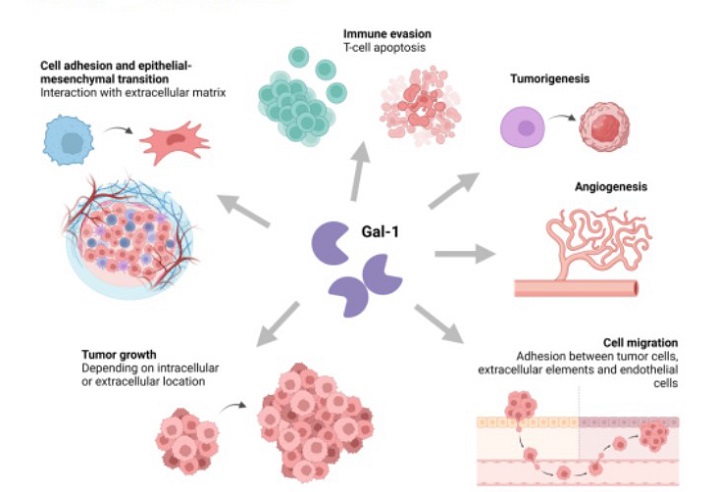Nikhil Prasad Fact checked by:Thailand Medical News Team Jul 09, 2024 9 months, 4 days, 10 hours, 59 minutes ago
Cancer News: Understanding Gastric Cancer
Gastric cancer (GC) is the fifth most common cancer and the third leading cause of cancer-related deaths globally. This type of cancer often goes unnoticed until it reaches an advanced stage, making treatment difficult. Recent research from a team of scientists shed light on a protein called Galectin-1 (Gal-1), which could play a significant role in the prognosis and treatment of GC. This
Cancer News report delves into the findings of this research and what it could mean for future cancer therapies.
 Key roles of Gal-1 in tumor development and metastases
What is Galectin-1?
Key roles of Gal-1 in tumor development and metastases
What is Galectin-1?
Galectin-1 is a protein involved in various cellular processes such as cell adhesion, migration, proliferation, and survival. It has also been linked to the formation of new blood vessels (angiogenesis) and the immune system's ability to evade cancer cells. These roles make Gal-1 a critical player in cancer progression and a potential target for new treatments.
Key Findings of the Study
The study, conducted by researchers from Complutense University of Madrid-Spain, Hospital Clínico San Carlos and Rey Juan Carlos University in Spain, focused on the expression of Gal-1 in gastric cancer tissues. The researchers analyzed tissue samples from 149 patients who underwent surgery for GC, looking specifically at the presence of Gal-1 in the stromal (connective tissue) and epithelial (tumor cells) compartments.
Galectin-1 and Tumor Characteristics
The study found that 96% of the tumors exhibited some level of Gal-1 expression in the stromal cells, with a cytoplasmic staining pattern observed in all cases. Epithelial Gal-1 expression was present in 63.8% of the tumors. The researchers noted that tumors with higher levels of Gal-1 in the stroma were associated with more aggressive cancer characteristics such as:
-Increased tumor necrosis (cell death)
-Lymphovascular invasion (cancer spread through lymph or blood vessels)
-Advanced tumor stages
-Higher rates of recurrence and cancer-related deaths
Prognostic Significance of Galectin-1
This study highlighted that both stromal and epithelial Gal-1 expressions are linked to worse cancer-specific survival (CSS). Patients with high stromal Gal-1 expression had significantly shorter CSS compared to those with lower expression levels. This suggests that Gal-1 could be used as a biomarker to predict patient outcomes and tailor treatment strategies accordingly.
Potential for Targeted Therapy
The findings indicate that Gal-1 could serve as a target for new therapeutic approaches in GC. By developing drugs that inhibit Gal-1, it may be possible to reduce tumor growth, spread, and improve patient survival rates. The research team suggests that combining Gal-1 inhibitors with existing immunotherapies could enhance treatment effectiveness.
/>
Looking Forward
While the study offers promising insights, further research is needed to fully understand the mechanisms by which Gal-1 influences gastric cancer progression. Expanding the research to include larger and more diverse patient populations will be crucial in validating these findings and translating them into clinical practice.
Conclusion
The study, conducted by Cristina Díaz del Arco, Lourdes Estrada Muñoz, María de los Ángeles Cerón Nieto, Elena Molina Roldán, María Jesús Fernández Aceñero, and Soledad García Gómez de las Heras, provides valuable insights into the role of Galectin-1 in gastric cancer. It underscores the potential of Gal-1 as a prognostic marker and therapeutic target, paving the way for more effective treatments in the future.
The study findings were published in the peer-reviewed journal: Biomedicines.
https://www.mdpi.com/2227-9059/12/7/1508
For the latest
Cancer News, keep on logging to Thailand Medical News.
Also Read:
https://www.thailandmedical.news/news/smarcd3-a-key-player-in-gastric-cancer-progression
https://www.thailandmedical.news/news/pd-l1-and-gastric-cancer
https://www.thailandmedical.news/news/herbs-and-phytochemicals-extracts-from-rhizomes-of-atractylodes-macrocephala-koidz-baizu-can-help-in-gastric-cancer
